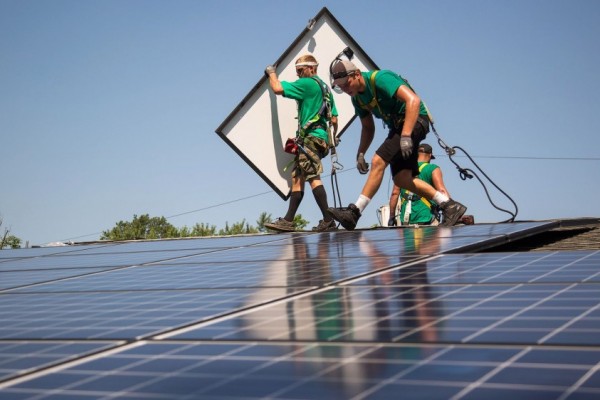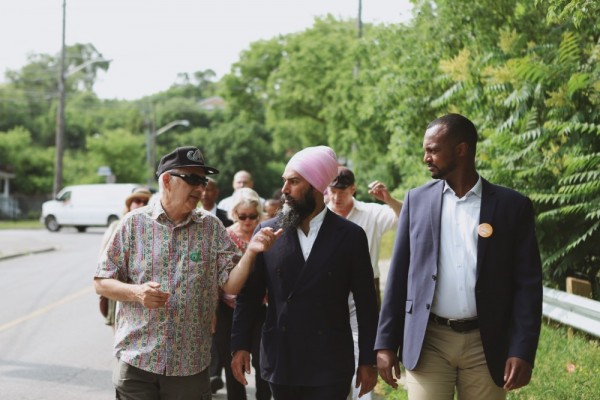Prospects for the federal election
We cannot allow the political arena to remain devoid of left-wing perspectives

Justin Trudeau. Photo courtesy European Parliament/Flickr.
The NDP is currently at its lowest level of popularity since its meteoric rise in 2011, when the party won 103 seats, including 59 in Québec, with nearly 31 per cent of the vote. Ambushed by Bloc Québécois leader Gilles Duceppe in 2015 on the issue of identity and the wearing of the niqab, Mulcair lost his lead and began his decline. Trudeau overtook the NDP on its left by promising to increase investment and maintain the deficit. The NDP ended with 19.71 per cent of the vote and 44 seats, including 16 in Québec.
The Bloc Québécois (BQ), which collapsed in 2011 with only 4 MNAs, climbed back up to 10 in 2015 – far from the 50 or so elected representatives it had in its heyday. With Yves-François Blanchet as BQ‘s new leader, it is now moving into a position of unilaterally defending the positions of François Legault’s government, for which Blanchet sees himself as the spokesperson in Ottawa.
Justin Trudeau’s treatment of Attorney General Jody Wilson-Raybould in the SNC-Lavalin scandal sent the Liberal Party into a tailspin from which it will have trouble recovering.
A recent survey revealed a decline in the Liberals’ share of the vote particularly in English Canada. Political elites in English Canada have begun building a wall of opposition against the Trudeau government’s plans to implement a carbon tax. The climate of Québec bashing is such that Trudeau appears in the rest of Canada as single-mindedly dedicated to defending jobs at SNC-Lavalin, while he is suspected of failing to muster the same zeal in defence of businesses in English Canada, particularly those in the fossil fuel industry (Bernard Rioux, “Quand le système de copinage des élites se grippe,” Presse-toi à gauche, March 13, 2019).
Indeed, the only place where the Liberals are in the lead is Québec, where, as of this writing, they are polling at 36.5 per cent of the vote, ahead of the Conservatives with 22.7 per cent, followed by the BQ with 18.7 per cent, the NDP with 13.2 per cent and the Green Party with 6 per cent. However, the Liberals and the Conservatives are neck in neck in the Maritime provinces.
If the trend holds, the traditional party of the Canadian Bay Street bourgeoisie will have failed to maintain its grip on power for more than a one term, after nine years of Conservative rule. The purchase of the Trans Mountain pipeline and all of Kinder Morgan’s core assets demonstrated the Liberal Party’s inability to commit to the energy transition in the face of pressure from the oil industry. Offering no alternatives, the Liberals deepened the social crisis, as evidenced by the yellow vest demonstrations in support of the oil industry and the concern for saving jobs. Trudeau’s attempt to avoid a lawsuit against SNC-Lavalin exacerbated matters, while accentuating the divisions between Québec and the rest of Canada. Obviously the Conservatives will push things even further.
In this context, the NDP unfortunately holds no appeal as a left-wing political alternative. It is part and parcel of the politics of austerity and the extractivist economy. It is incapable of grasping the importance of Québec’s national liberation struggle against the domination of the Canadian state and its institutions, precisely, because it aims to reform those institutions. This is an unachievable goal in a state controlled by financial institutions and multinational corporations. Several successive generations of activists have tried in vain to get the party to change course, the latest one being the group around the Leap Manifesto.
In addition to its descent into ethnic nationalism, the Bloc Québécois is equally wedded to neoliberal and extractivist politics. Moreover, this is a party that was founded with the sole mission: to champion the 1995 referendum on the federal political scene. Clearly it cannot and does not represent an alternative; it only sows illusions in Québec and creates divisions with people waging resistance in the rest of Canada.
This is an urgent situation. We cannot allow the political arena to remain devoid of left-wing perspectives. Several activists from Québec and English Canada have done some spadework in recent years to establish a pan-Canadian left network. It is now time to take up the challenge of building a real leftwing political alternative.
Translated by Andrea Levy.
André Frappier is a regular contributor to CD. He also serves on the editorial board of the online weekly Presse-toi à gauche and has been a member of the FTQ Montréal Labour Council for many years.
This article appeared in the Summer 2019 issue of Canadian Dimension (CD Goes Digital).










